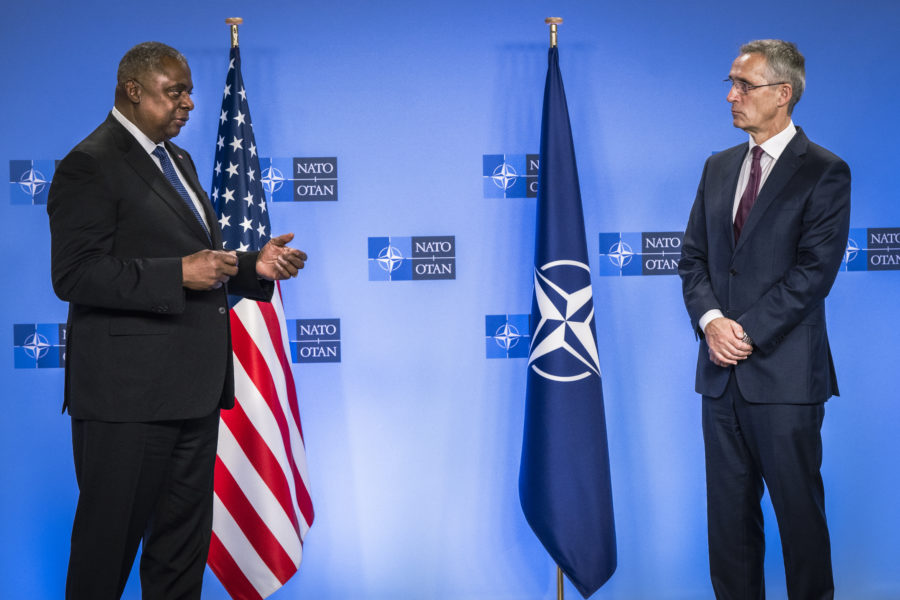The U.S. and its Western allies expressed concern that fresh Russian allegations against Ukraine—that it plans to use a radioactive so-called “dirty bomb”—may be a pretext for a major escalation in Moscow’s war with its neighbor.
But U.S. officials said they had detected no signs that Russia is planning to use nuclear arms and therefore had no reason to raise the alert level of U.S. nuclear forces.
“We see no reason to change our strategic nuclear posture,” White House National Security Council strategic communications coordinator John Kirby said Oct. 24.
Apprehensions about Russia’s strategy emerged Oct. 23 when Russia’s Defense Minister, Sergey Shoygu, called Defense Secretary Lloyd J. Austin III and three other NATO defense chiefs and charged that Kyiv was preparing to use a dirty bomb, which combines radioactive material and conventional explosives.
Russia’s foreign affairs ministry echoed the allegation the next day, as did Gen. Valery Gerasimov, the chief of the Russian General Staff, in calls with Gen. Mark A. Milley, the U.S. Chairman of the Joint Chiefs of Staff, and Adm. Tony Radskin, Britain’s Chief of Defense Staff.
The governments of the U.K., France, and the U.S., all nuclear powers, issued a joint statement that said the allegation against Ukraine was false and warned Russia not to “use this allegation as a pretext for escalation.” Russia’s forces were in an increasingly precarious position as they pushed back against a Ukrainian counteroffensive in the east and south of the country.
U.S. officials said they were unsure about Russia’s motivations for making the charge. The allegations, they said, could be an attempt to pressure the West to curtail its military support for Ukraine, might be a propaganda exercise, or could be an indication that Russia might be preparing to use a dirty bomb of its own or other weapons of mass destruction.
“We have seen in the past that the Russians have, on occasion, blamed others for things that they were planning to do,” Kirby said. “We don’t have any indication that that’s the case, but it is a play that we have seen before.”
State Department spokesperson Ned Price reinforced that message. “It would certainly be another example of President Putin’s brutality were he to use a so-called dirty bomb,” Price said Oct. 24. “There would be consequences for Russia, whether it uses a dirty bomb or a nuclear bomb.”
Ukraine also rejected the allegations and invited the International Atomic Energy Agency to Ukraine to inspect any claims. Concerned about the Russian statements, top Western defense and military officials began a flurry of consultations, including with NATO Secretary General Jens Stoltenberg.
“You can expect to see a series of phone calls with allies and partners in the days ahead as well,” a U.S. military official told reporters.
Top U.S. and Russian defense officials had not talked since May until Shoygu and Austin spoke on Oct. 21 at the request of the U.S. On Oct. 23, Shoygu initiated a series of calls to the defense ministers of the United Kingdom, France, and Turkey, as well as Austin.
The latest flare-up between Moscow and the West comes as NATO is in the middle of its Steadfast Noon tactical nuclear exercise. The exercise is held annually, and NATO and U.S. officials announced some details in advance, such as the presence of American B-52 bombers from Minot Air Force Base, N.D. U.S. and NATO officials said the exercise was unrelated to real-world situations and have also said Russia will soon conduct its annual Grom nuclear exercise.
Kirby said the U.S. has not seen “physical preparations” for the use of a nuclear weapon by Russia.
“We have been nothing but honest with all of you that we take that rhetoric seriously,” Kirby said. “We have to. It would be irresponsible if we didn’t.”
